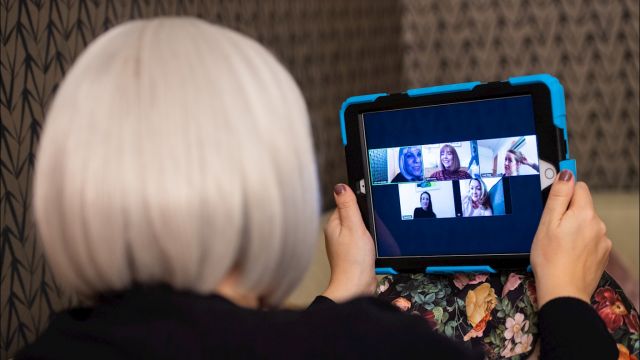More than half of doctors and nurses working at the National Maternity Hospital attended online education in their pyjamas due to the Covid-19 pandemic, a study has found.
Educational meetings at Holles Street’s neonatal intensive care unit were assessed over a two-week period in June last year, which found that prior to the pandemic, attendees typically wore scrubs or workwear, but now 59% attended online education sessions in their pyjamas.
Of those who attended, 95% said they are more likely to engage in virtual learning than traditional attendance, while the same number found such sessions useful and attendance doubled compared to 2019, with 83% attending when not scheduled to work.
The study, Pyjama Sessions: Transition to Online Education During a Pandemic, published in this month’s Irish Medical Journal, found that a shift towards flexible working necessitates a creative approach to education.
Virtual education
Co-author Dr Aoife Cassidy from Tallaght University Hospital said that the pandemic has been a catalyst for moving towards virtual education, which the study showed can increase attendance and remain useful to medical staff.
“The pandemic necessitated immediate change worldwide in patterns of working, education and lifestyle. The requirement for social distancing meant that long-established forms of medical education had to be cancelled or moved online.
“In an effort to maintain continuing professional development (CPD) following public health restrictions on face-to-face meetings, we rapidly adapted to an online educational platform in April 2020,” said Dr Cassidy, a paediatric specialist registrar.
“We aimed to gauge successful transition to virtual learning and identify how these changes in practice could be factored into future planning of educational programmes. We noted a dramatic increase in attendance with the majority reporting virtual education to be useful and more family friendly, a factor rarely assessed in teaching programmes.”
Anxiety
However, the study found that the doctors and nurses reported anxiety regarding technical issues and lack of audience feedback, while almost all attendees worried about unknowingly leaving their camera or microphone on.
Participants also said they missed the collegiality that resulted from face-to-face teaching sessions and the requisite coffee afterwards. Due to the nature of virtual platforms, only one participant can communicate at a time and attendees often cannot see each other, leading to a sense of artificiality and a paucity of “catch-up chat”.
The study also found that attendance at teaching sessions doubled compared to 2019, 83% attended sessions when not scheduled to work. During a typical session, one quarter of those attending were not scheduled to work that day. On a daily basis, 50% were in work, 16% travelling, 20% in their kitchen or living room and 14% in their bedroom/bathroom.

Up to 78% reported finding it easier to attend a virtual session late, 88% felt that they were more likely to multi-task and felt that virtual sessions were more family friendly.
“Initiatives that support morale and team-development are essential as virtual education becomes the norm. This pandemic has been the catalyst necessary to advance virtual learning. Our findings can help future planning not just in this setting but also in the provision of the best, most accessible, educational platform for staff.
“Zoom anxiety is prevalent, and we suggest that healthcare workers should invest in a good pair of pyjamas,” added Dr Cassidy.







